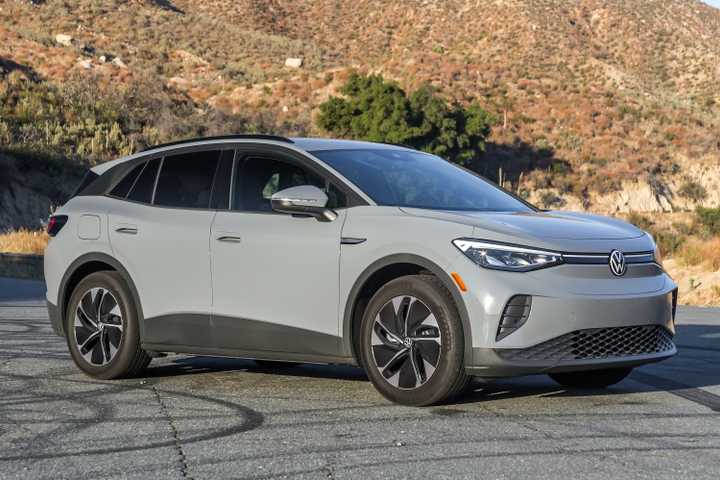If you want an affordable EV, buying used is still the smartest move. With new EVs averaging around $60,000 in the U.S., getting a nice one without spending a fortune can be tricky.
Sure, you can find new EVs under $30,000, but they’re often a bit bare-bones. Used EVs used to lose value fast, but depreciation has slowed, making them a sweet spot for savvy buyers.
Even with the high sticker price of new EVs, you can snag a premium model for around $20,000 if you shop used. Among the upscale EV SUVs options are limited, but we’ve found one that stands out, and it’s worth every penny.
To give you the most up-to-date and accurate information possible, the data used to compile this article was sourced from various manufacturers and other authoritative sources, including Edmunds, the EPA, IIHS, NHTSA, and Kelley Blue Book.
2021 Volkswagen ID.4—a Used EV SUV That Gives You More for Less
The Volkswagen ID.4 is a five-seat electric crossover that hit the U.S. market in early 2021. It made a splash right away, earning the World Car of the Year title in 2021 before the Hyundai Ioniq 5 and 6 claimed it in the following years.
Think of the ID.4 as a cousin to the Volkswagen Tiguan, but with a smarter use of space thanks to its EV design. Unlike the earlier electric Golf, this was VW’s first fully dedicated EV, replacing the engine and gas tank with a sleek motor and battery setup.
Expect to Pay Around $20,000 for a 2021 ID.4 Pro
The 2021 Volkswagen ID.4 came in five trims—three RWD and two AWD. RWD models had 201 horsepower, while AWD versions packed 302 horsepower, with ranges from 240 miles for the top AWD to 260 miles for the basic RWD Pro.
While those numbers might seem modest compared to 300-plus mile EVs, they’re still plenty for most drivers. A few newer EV SUVs fall in a similar range, including the Volvo EX30, Toyota bZ4X, and Subaru Solterra.
On the used market, you can expect to pay around $19,439 for the ID.4 Pro, $20,452 for the 1st Edition, and $20,253 for the Pro S, according to Kelley Blue Book. Even at these prices, you still get surprisingly premium features, like:
- Heated seats
- Wireless smartphone compatibility
- A 10-inch touchscreen
Key Specs for the Volkswagen ID.4
The 2021 Volkswagen ID.4 was available in both RWD and AWD, each with its own unique specs. Let’s take a closer look at the entry-level trim for each drivetrain.
|
Model |
ID.4 Pro RWD |
ID.4 Pro AWD |
|---|---|---|
|
Powertrain |
ASM Asynchronous |
ASM Asynchronous/PSM Permanent Magnet |
|
Horsepower |
201 HP |
295 HP |
|
Torque |
229 LB-FT |
339 LB-FT |
|
Transmission |
Single-Speed Automatic |
Single-Speed Automatic |
|
Battery Capacity |
82 kWh |
82 kWh |
|
Range |
260 Miles |
250 Miles |
|
Fuel Economy (City) |
91 MPGe |
90 MPGe |
|
Fuel Economy (Highway) |
107 MPGe |
102 MPGe |
|
Fuel Economy (Combined) |
91 MPGe |
90 MPGe |
Range That Holds Up Even Today
All 2021 Volkswagen ID.4 models use an 82-kWh battery. The single-motor RWD delivers 201 horsepower, while the dual-motor AWD bumps it up to 295 horsepower.
Packing the same battery into a more powerful AWD setup naturally reduces range. This is a pattern you see across EVs today—from Hyundai and Toyota to Tesla—with long-range RWD models and shorter-range, high-performance AWD variants.
For example, the 2025 Tesla Model Y RWD Long Range can go 337 miles, while the AWD Performance version drops to 277 miles.


- Base Trim Engine
-
Electric
- Base Trim Transmission
-
Single Speed Automatic
- Base Trim Drivetrain
-
Rear-Wheel Drive
- Base Trim Horsepower
-
201 hp
- Base Trim Torque
-
228 lb-ft
RWD ID.4s Deliver an EPA-Rated 260 Miles
When the VW ID.4 hit the U.S. in 2021, a 250–260 mile range was considered solid—and it still holds up today. Battery technology has improved since then, with some EVs now pushing 300–400 miles per charge.
Those long-range EVs come at a premium, often closer to $100,000 than $50,000. More affordable EVs stick to sub-300-mile ranges, which cover most daily driving needs.
The average driver logs about 37 miles per day, so a 250-mile battery easily lasts several days. And if you need to go farther, DC fast charging is always an option.
DC Fast Charging Lets You Plug In at Up to 125 kW
Charging the 2021 Volkswagen ID.4 at home takes about 7.5 hours using a 240-volt outlet. That’s perfect for overnight top-ups.
For faster options, the ID.4 can handle 125 kW at thousands of public charging stations. Volkswagen has also partnered with Tesla, so you can use their network with a special adapter.
With fast charging, you can get up to 80 percent in under 40 minutes—just enough for a quick break on longer trips.
AWD Option for Added Versatility
EVs are built differently than the cars we’re used to. The battery sits flat under the floor between the wheels, keeping most of the weight low and giving the ID.4 a surprisingly composed ride for a tall SUV.
The flat floor also opens up interior space since there’s no driveshaft bulge or exhaust to work around. That’s why the ID.4 matches the VW Tiguan for space, even with a smaller footprint.
RWD is ideal for everyday driving and gives a bit more range, but the AWD option adds power and versatility if you want to tackle rougher roads.
Reliability You Can Count On, Backed by Warranty and Data
Original-14094-210821VWID4AWD0691HDR
Buying a used car can feel intimidating, especially if it’s a brand or an EV you haven’t owned before.
Volkswagen has been part of U.S. car culture since the ’60s and is well known for quality, durability, and reliability.
EVs are a different experience than the gas-powered cars most of us know, and the more you understand the ID.4, the smarter your buying decision will be.
Long-Term Confidence With an 8-Year/100,000-Mile Battery Warranty
Most new cars come with a three-year or 60,000-mile warranty, so a 2021 model is likely out of coverage. The ID.4 is much simpler mechanically than a gas or hybrid car, with the battery pack being the biggest and most expensive component.
Beyond the battery, it mostly has one or two electric motors and some electronics—both long-lasting and relatively inexpensive to fix.
Volkswagen backs the ID.4 with an eight-year/100,000-mile battery warranty, meaning a 2021 model still has coverage for a few years and remaining miles. Even better, a Stanford study suggests EV batteries last about 40 percent longer than previously expected, so you can reasonably expect the battery to keep going well past the warranty period.
Maintaining Strong Reliability Scores
Safety and reliability are non-negotiables, especially for a family car. The 2021 Volkswagen ID.4 earned the IIHS Top Safety Pick+ award, ranking it among the safest in its class.
The NHTSA also gave it a perfect 5-star rating in crash tests, adding more confidence for buyers.
There are plenty of reviews out there, with trusted sources like Car and Driver and Edmunds weighing in. Not every comment was glowing, but one quote really stood out:
Its spaciousness, practicality, and healthy driving range make it very appealing to the masses. We don’t consider this a fun-to-drive vehicle in the recreational sense, but it does make for comfortable transport that we wouldn’t mind driving every day. And as one of the more spacious vehicles in the class with a decent amount of real-world range, it can certainly get you places where fun can be had.
Practical and Versatile, Just Like an SUV Should Be
The Volkswagen ID.4 isn’t chasing flashy brands like Tesla or Mercedes.
It’s an EV, but it competes directly with practical compact SUVs like the Toyota RAV4 and Honda CR-V.
To stand out, it needs to deliver the same qualities that make those everyday favorites so popular.
Over 30 Cubic Feet of Cargo Room for Everyday Hauls
A compact crossover needs to be comfortable for passengers, and the ID.4 delivers. Front seats offer 41 inches of head- and legroom, with nearly 40 inches available in the back.
Cargo space is just as practical, starting at 30.3 cubic feet behind the rear seats. Fold them flat, and that expands to a roomy 64.2 cubic feet, making the ID.4 surprisingly versatile for daily errands or weekend adventures.






